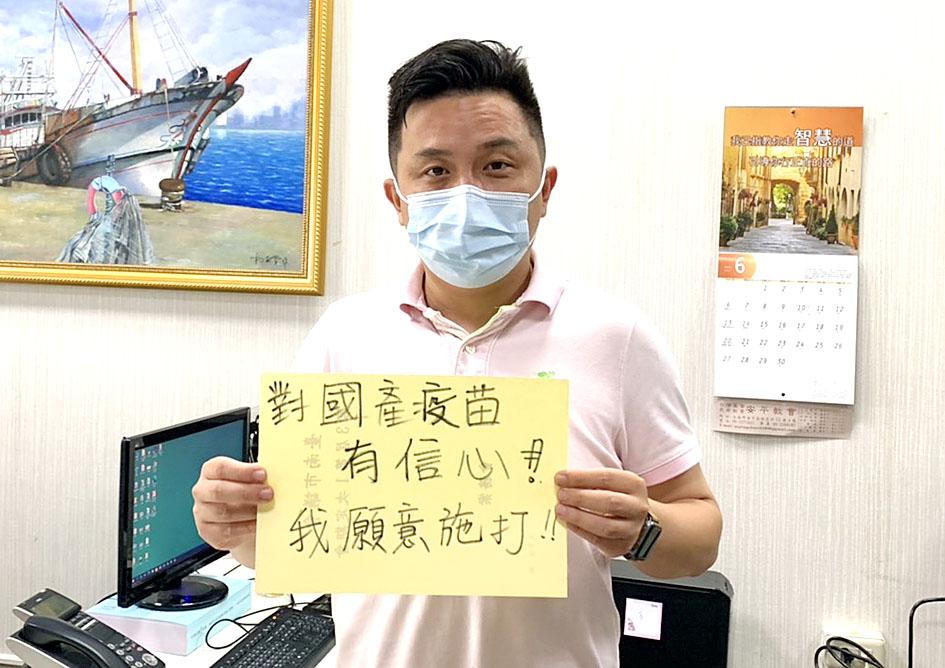Phase 2 clinical trial results of a COVID-19 vaccine developed by Medigen Vaccine Biologics Corp generated good data, experts said, although they warned that there was still no way to know how effectively it would prevent the disease.
“Data look quite good,” Academia Sinica researcher Michael Lai (賴明詔) said on Thursday after Medigen announced that its vaccine candidate had shown no major safety concerns.
The data showed that the vaccine produced sufficient neutralizing antibodies and as long as there were antibodies, there should be protection, Lai said, adding that its toxicity was low.

Photo: Tsai Wen-chu, Taipei Times
The Medigen vaccine has achieved the goals of creating sufficient neutralizing antibodies and having low toxicity, but only phase 3 trials could determine if it actually protects people who receive it, said Lai, who is a virologist and a coronavirus researcher.
There are many ways to produce vaccines, including via protein subunits such as the one Medigen is working on, he said.
The most traditional way is to use the virus to produce a vaccine with several proteins that the immune system recognizes should not be there, triggering an immune response, he said.
However, this method can produce a level of toxicity, he said.
A protein subunit vaccine has only one protein, in this case a spike protein, he said.
“It is purer, but could trigger a weaker immune reaction,” Lai said. “Different vaccine production methods have different advantages and disadvantages. One cannot be compared to another.”
It could take several years for a domestic vaccine to go through phase 3 trials, so given Taiwan’s situation, “it should opt for second-best,” even though major vaccines made elsewhere in a matter of months obtained enough efficacy data in phase 3 trials to get emergency use authorization (EUA), he said.
It would be acceptable for Medigen to apply for EUA with only the results of its phase 2 trials, he said.
National Taiwan University Hospital pediatrician Lu Chun-yi (呂俊毅), who is secretary-general of the Taiwan Immunization Vision and Strategy organization, said that the Medigen data were “good.”
Almost every participant had antibodies after being inoculated and the antibody concentration data were promising, Lu said.
However, there is no international consensus on how high the geometric mean titer (GMT) — or antibody concentration — has to be to indicate sufficient protection, he said.
Moreover, no uniform, globally accepted method for verifying antibody concentrations exists, meaning that vaccines have a wide range of GMTs, from as low as just over 100 to above 3,000, he said.
Different laboratories conduct trials with different materials and methods, leading to results that vary across labs, Lu said.
Shih Shin-ru (施信如), who heads the Research Center for Emerging Viral Infections at Chang Gung University said that it was still too early to say whether Medigen had successfully developed a COVID-19 vaccine, because nobody knows how high the neutralizing antibody concentration needs to be.
Medigen said it would seek an EUA from the Food and Drug Administration as soon as possible based on the promising results from its phase 2 clinical trials.
It would also apply to the European Medicines Agency and other international health authorities to begin phase 3 clinical trials as soon as possible, it said.

A Vietnamese migrant worker on Thursday won the NT$12 million (US$383,590) jackpot on a scratch-off lottery ticket she bought from a lottery shop in Changhua County’s Puyan Township (埔鹽), Taiwan Lottery Co said yesterday. The lottery winner, who is in her 30s and married, said she would continue to work in Taiwan and send her winnings to her family in Vietnam to improve their life. More Taiwanese and migrant workers have flocked to the lottery shop on Sec 2 of Jhangshuei Road (彰水路) to share in the luck. The shop owner, surnamed Chen (陳), said that his shop has been open for just

Actress Barbie Hsu (徐熙媛) has “returned home” to Taiwan, and there are no plans to hold a funeral for the TV star who died in Japan from influenza- induced pneumonia, her family said in a statement Wednesday night. The statement was released after local media outlets reported that Barbie Hsu’s ashes were brought back Taiwan on board a private jet, which arrived at Taipei Songshan Airport around 3 p.m. on Wednesday. To the reporters waiting at the airport, the statement issued by the family read “(we) appreciate friends working in the media for waiting in the cold weather.” “She has safely returned home.

Global bodies should stop excluding Taiwan for political reasons, President William Lai (賴清德) told Pope Francis in a letter, adding that he agrees war has no winners. The Vatican is one of only 12 countries to retain formal diplomatic ties with Taiwan, and Taipei has watched with concern efforts by Beijing and the Holy See to improve ties. In October, the Vatican and China extended an accord on the appointment of Catholic bishops in China for four years, pointing to a new level of trust between the two parties. Lai, writing to the pope in response to the pontiff’s message on Jan. 1’s

TAKE BREAKS: A woman developed cystitis by refusing to get up to use the bathroom while playing mahjong for fear of disturbing her winning streak, a doctor said People should stand up and move around often while traveling or playing mahjong during the Lunar New Year holiday, as prolonged sitting can lead to cystitis or hemorrhoids, doctors said. Yuan’s General Hospital urologist Lee Tsung-hsi (李宗熹) said that he treated a 63-year-old woman surnamed Chao (趙) who had been sitting motionless and holding off going to the bathroom, increasing her risk of bladder infection. Chao would drink beverages and not urinate for several hours while playing mahjong with friends and family, especially when she was on a winning streak, afraid that using the bathroom would ruin her luck, he said. She had